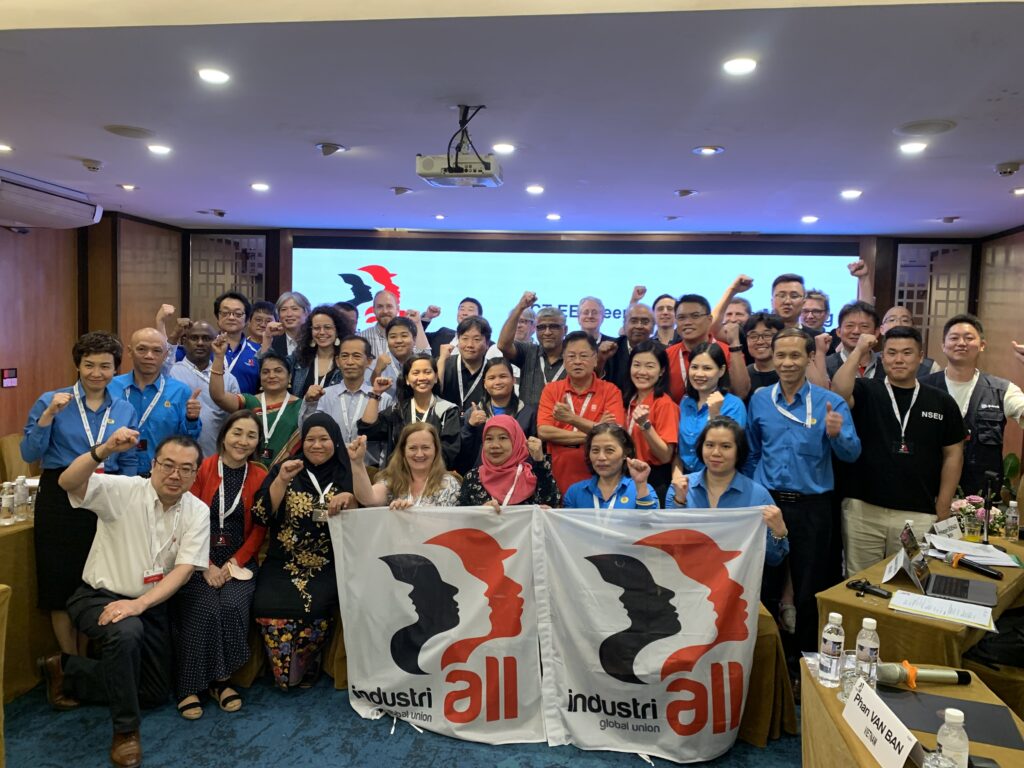Read this article in:
English
23 May, 2023Organizing, sector development, health and safety and human rights due diligence were topics discussed at the ICT, electrical and electronics steering committee meeting, in Vietnam on 9 and 10 May.
While organizing in the sector has proven to be difficult, especially in companies like Amazon, Apple, Samsung and Microsoft, where union presence is low, there has been some improvements in recent years. The meeting saluted affiliates on their organizing efforts and committed to making organizing a top priority for the sector.
The participants from Korean Metal Workers Union reported about their successful organizing at Samsung SDI in June 2022. This success is added to the earlier achievement in 2019 when another IndustriALL affiliate Federation of Korean Metalworkers' Trade Unions reported about successful organizing of workers in three Samsung subdivisions including Samsung SDI. The trade unions expressed their concerns over working conditions at Samsung, they referred to an unfair and non-transparent wage system which makes workers compete as well as hard working hours.
Participants discussed the volatility of the semi-conductor industry due to a declining market, quick changes in the industry and a complex division of labour. The steering committee emphasized further development of the global semi-conductor network, facilitating exchange of information and good practice among IndustriALL affiliates.
Trade unions aim to use human rights due diligence (HRDD) laws from Germany, France and other European countries, and guidelines from Japan to demand socially responsible investment in semi-conductor and other electronics production industry and its supply chain, together with existing leverage from global framework agreements and trade union networks.
Alexander Ivanou, IndustriALL director of ICT, electrical and electronics, said:
“We need to build cases with HRDD laws and guidelines to ensure that ILO standards and human rights are respected in the industry. ILO member states are required to adhere to all ILO fundamental conventions, including the recently added occupational health and safety conventions 155 and 187.”
Malaysia’s Electronics Industry Employees’ Unions Coalition (EIEU) said that 20 workers at ST microelectronics died during the pandemic as a result of an unsafe working environment.
The steering committee voiced great concern over the potential impact on jobs posed by artificial intelligence (AI). Trade unions call for just transition for all workers affected by AI, stating that rules need to be adopted and workers should be part of development.
Prihanani Boenadi from the Federation of Indonesian Metal Workers' Union (FSPMI) and co-chair of this sector said,
“we have an important role to play in protecting workers' rights in the digital age. Unions must very soon commit to reshaping digitalisation, to negotiating for stronger workers’ rights in relation to the influx of digital technologies into workplaces, Unions will need to mitigate the harms that these technologies can and are inflicting on workers.”
“We need to deepen our discussions to secure a better future. In addition to responding to the turmoil in the international energy market and the supply-demand crunch caused by Russia's invasion of Ukraine, it is necessary to develop a system to ensure a stable supply of electricity while promoting the use of decarbonized power sources. Energy and raw material prices are soaring and these developments have a significant impact on our work and daily lives as prices continue to soar,”
said Masashi Jimbo, president of Japanese Electrical Electronics & Information Union, JEIU and the ICT E&E sector co-chair.
